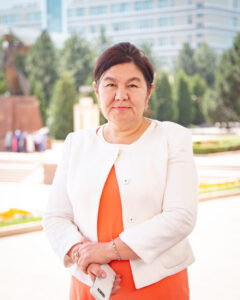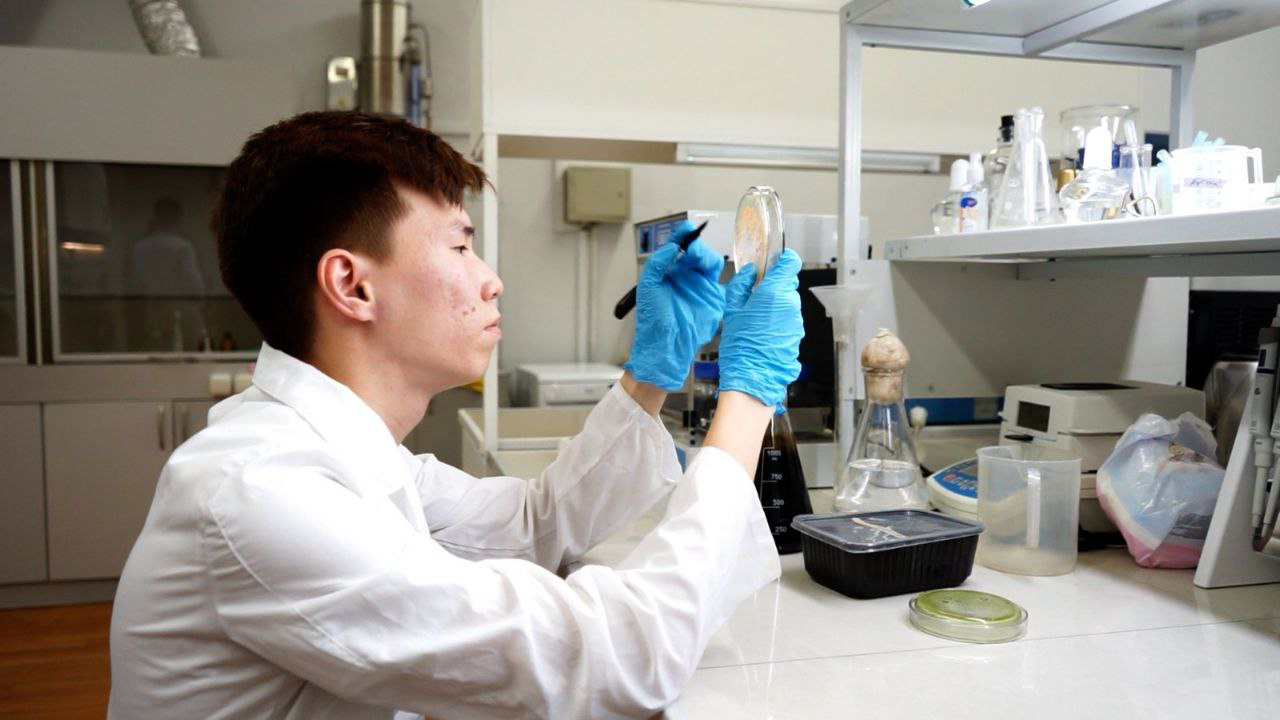A university that has found a balance between the Eastern and Western worlds occupies a special place in human civilization.
When did the concept of the university first appear? The question of what the first university was like has intrigued many people. According to available sources, the first university was founded in the Ancient Moroccan city of Fez. The University of al-Qarawiyyin, an educational and spiritual center of the Islamic world, was established here. This university, with its lecture halls, featured arched staircases where lecturers would climb to deliver their lectures. In the Middle Ages, renowned scholars such as Ibn Arabi, Ibn Khaldun, Al-Tarisi, Maimonides, and Al-Hassan Muhammad al-Bazzan lectured in this building.

Gulmira Sultanbayeva.
Today, the university that bridges the Eastern and Western worlds play a crucial role in fostering academic dialogue and spiritual growth, thus ennobling humanity. “All the stairs lead to the University of al-Qarawiyyin,” said the ancient Moroccans. For Kazakh society, this journey towards education and enlightenment is epitomized by the al-Farabi Kazakh National University (KazNU).
Any university represents a significant advancement in education and science, and KazNU is particularly esteemed in Kazakh society. The university’s development, which bridges the Eastern and Western worlds, lays the foundations of education and science for global civilization.
KazNU has established international agreements with more than 500 foreign universities and research centers. Each academic year, more than 100 foreign professors and scientists from 30 countries lecture at KazNU. The visit of Teacher Farabi to the East opened a window to the world, and this legacy is continued by the National University’s professors in today’s context. These professors conduct scientific research at universities in Hungary, Germany, Mongolia, France, the United States of America, Russia, Türkiye, Uzbekistan, and other countries. Additionally, over 2,500 young foreign citizens from 30 countries come to study in Kazakhstan, with KazNU expanding the horizons of knowledge and representing Kazakh civilization to the world.
KazNU is the country’s leading exporter of educational services. Currently, university branches have been opened in Istanbul (Türkiye) and Bishkek (the Kyrgyz Republic). A branch of the National Research Nuclear University, Moscow Institute of Engineering Physics, has also been established at KazNU. Joint and double-degree programs are being implemented with foreign universities, including La Sapienza University (Italy), University of Lorraine (France), University of Wismar (Germany), University of Reims Champagne-Ardenne (France), University of Cadiz (Spain), University Institute of Lisbon (INCSTE) (Portugal), Nicolaus Copernicus University in Toruń (Poland). Reinterpreting the aphorism of the encyclopedist al-Farabi: “Gaklia is a miracle, you are the door,” we can say that knowledge and science are indeed miracles—an environment open to the world, serving as a lever, support, and enlightener of a society that possesses knowledge and science.
Primary state science vector: On the university horizon
For society, the university holds an unprecedented, immeasurable significance, attracting minds with a force that defies gravity. KazNU serves as a beacon for Kazakh society, akin to the Milky Way for any traveler embarking on a journey for knowledge. Those who choose the path of science cultivate their knowledge, much like the gardens of Babylon.
At a National Council for Science and Technology meeting, President Kassym-Jomart Tokayev emphasized that science is a path that stimulates societal development.

A student working at the lab. Photo credit: Alan Bondarev.
In this regard, KazNU scholars, who are making strides in predicting man-made and natural disasters and offering climate change solutions, can be deemed strategic. Under the leadership of Rector Zhanseit Tuimebaev, KazNU has made significant advancements in research databases, monitoring fundamental and applied results, and providing practical solutions to many problems. Tuimebaev initiated 10 innovative projects within the scientific center for Sustainable Development and Rational Environmental Management, focusing on climate change laboratories and implementing the Sustainable Development Goals.
The scientific center, which occupies a leading position in global research, focuses on climate studies and modeling, digital cartography and applied geodesy, GlobalSky (an innovative laboratory for atmospheric research), sustainable tourism, and water quality analysis.
Measures are also being implemented to study geoinformation analysis of landscape degradation, geodemographic and socio-economic research, environmental safety, soil ecology, and environmental monitoring. These studies are crucial for understanding and preventing the consequences of floods in the country and introducing optimal technologies. KazNU’s next strategic step in the fight against climate change was the joint work of the Kazakh-Chinese laboratory, Technology and Application of Remote Sensing. The new center monitors environmental problems in the Central Asian region, such as water shortages, drought, and land depreciation resulting from climate change. It ensures environmental safety and sustainable development by warning about natural hazards in the region using remote monitoring. This initiative will create a high-level international resource and environmental platform for Kazakhstan, China, and Central Asia.
The creation of the modern Farabi Chem Science cluster is the third step in the fight against climate change, led by an innovative and globally fundamental community. The cluster includes nine scientific laboratories and is located at the Faculty of Chemistry and Chemical Technology. Modern laboratories identify and analyze environmental pollutants and develop new materials for chemical power sources. By conducting in-depth research in the field of petrochemistry, scientists are striving to obtain biomedical agents and antibacterial protective coatings.
The Chemical Sciences Cluster includes a laboratory of analytical chemistry and the environment, a laboratory of electrochemical production technologies, a petrochemical laboratory, a chemical-medical laboratory, a laboratory of fine organic synthesis, a laboratory of energy-intensive nanomaterials, a laboratory of advanced materials and technologies, a laboratory of high-precision diagnostics of materials and the Chemical Coatings research and production center. The fact that scientists conduct research using the latest devices and apparatus significantly contributes to scientific capital. KazNU has Kazakhstan’s leading scientific research schools in chemistry, medicine, and biology.
Within the framework of the United Nations, a regional climate summit will be held in Kazakhstan in 2026. Research conducted at the university will focus on achieving the standard solutions and research objectives of Kazakh scientists in the fight against climate change. Al-Farabi, the second teacher after Aristotle, compared the power of chemical science with the discovery of the philosopher’s stone, which can turn any metal into gold, rejuvenate the elderly, and heal diseases.
The fight against global warming and climate change will undoubtedly be productive. The results of scientists’ constant labor will become a modern “climate stone.”
Heights of reason
The world is diverse, with its countries, nations, languages, religions, laws, and principles. However, the hearth of reason, knowledge and science, kindled by scientists, is the unchanging epicenter of these values, the scales of eternal civilization. Society advances with time, and everything ahead of its time signifies development. Members of society observe each other, interact, and change for the better. In this dynamic process, the global forces of social society continuously develop and influence us. It is vital to take a critical, firm position in the continuous flow of changes, quickly moving in the right direction.
KazNU is on par with world-class research universities in the international educational and scientific space. Recently, KazNU entered the top 200 universities in the world in the global QS university rankings, rising by 67 positions in nine indicators, from 230th to 163rd place. This achievement marks it as the first university in Central Asia to be included in the top 200 best universities.
The research university, with a growing academic reputation and demand for graduates among employers, has also achieved impressive results regarding faculty-student ratio, student numbers, expansion of international research, and sustainability indicators. It is worth noting that in recent years, the university has undergone a comprehensive structural modernization, and joint international scientific laboratories have been established. Experimental educational programs have been developed that have passed international accreditation in accordance with high standards, and branches of foreign universities have been opened.
A university operates like clockwork, where every second counts. Each university teacher and scientist contributes to the formula for continuous development. The research team jointly creates a sustainable university ecosystem, improving the quality of educational programs in 17 areas of the UN Sustainable Development Goals, and intensifying innovative research and new technologies.
The university model is a product of effective management. To develop science, KazNU continuously works to increase cooperation with leading universities worldwide, promote academic mobility, and foster social partnerships.
An essential result of this academic competition is KazNU’s impressive rise by 400 positions in the Times Higher Education University Impact Rankings. For the first time, KazNU has secured a place in the Top 401-600 universities. This international ranking includes 1,963 universities globally. As the hub of the UNAI – UN Academic Impact Initiative, KazNU is at the forefront of achieving the Sustainable Development Goals, taking 56th place in “Gender Equality” and 68th in “Affordable and Clean Energy,” thereby entering the top 100 in these categories.
Al-Farabi’s teachings guide the university’s path to happiness, emphasizing a triad of theoretical, mental, and ethical virtues combined with practical art, forming a holistic approach to joy. This intellectual pedestal is achievable through effective management and the sustainable goals of the team.
The author is Professor Gulmira Sultanbayeva, the head of the Press and Digital Media Department of the Faculty of Journalism at al-Farabi Kazakh National University, Almaty.
